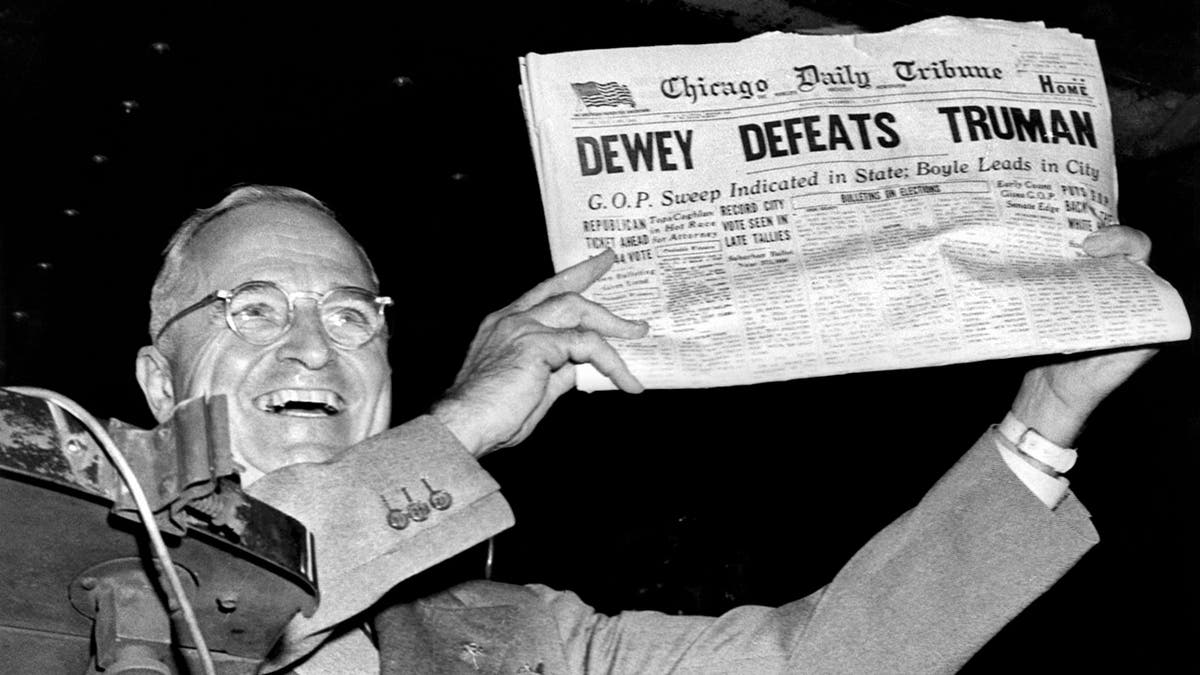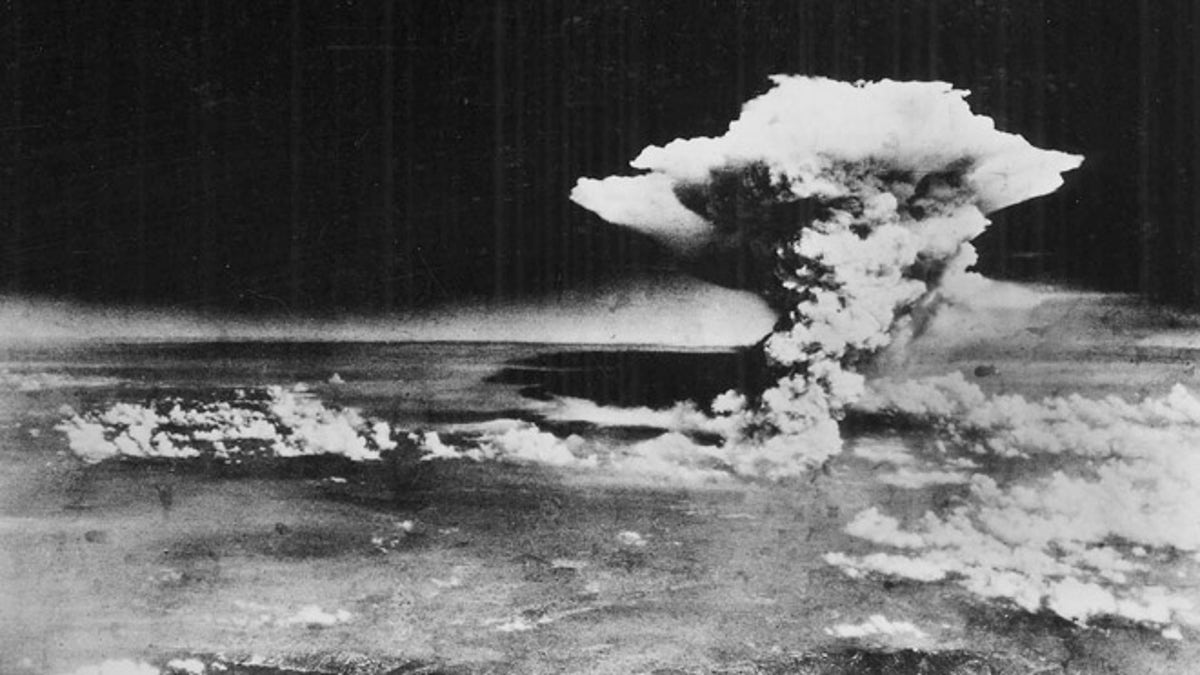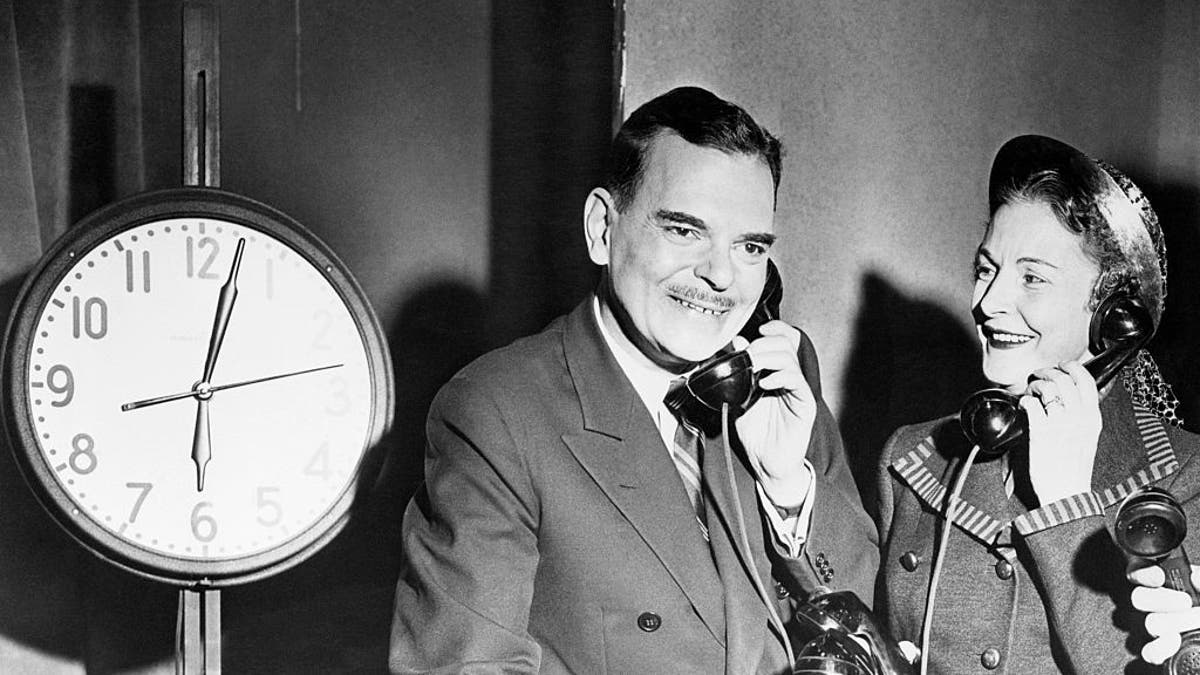Brian Kilmeade visits Harry Truman's 'Little White House' in Florida
Don't miss season 6 of 'What Made America Great' on Fox Nation.
Embattled President Harry S. Truman shocked political pundits and mocked national headline makers when he defeated Republican challenger Thomas E. Dewey in the race for the White House on this day in history, Nov. 2, 1948.
"Dewey defeats Truman," screamed the headline the following day in the Chicago Daily Tribune, the paper famously held aloft by the beaming president.
The dramatic but erroneous over-sized font was a testament to the assuredness the experts had of a new era in Washington, D.C.
The president's "defeat had been widely expected and often predicted, but Truman's energy in undertaking his campaign and his willingness to confront issues won a plurality of the electorate for him," proclaimed the website of the Harry S. Truman Library & Museum.
"His famous ‘Whistlestop’ campaign tour through the country has passed into political folklore, as has the photograph of the beaming Truman holding up the newspaper whose headline proclaimed, ‘Dewey Defeats Truman.’"

President Harry Truman holds up a copy of the Chicago Daily Tribune declaring his defeat to Thomas Dewey in the presidential election, in St. Louis, Missouri, November 1948. (Underwood Archives/Getty Images)
Truman’s presidency, his first term most notably, was one of the most consequential in American history.
He ascended to the office following the death of President Franklin D. Roosevelt, in April 1945, less than three months after he became vice president.
The president’s "defeat had been widely expected and often predicted." — Truman Library
He oversaw the World War II defeat of Germany in May; led America into its leadership role of the United Nations, chartered in June; ordered the atomic bombings of Hiroshima and Nagasaki to hasten the end of the war in August; and celebrated the surrender of Japan and the end of World War II in September.
"Truman made some of the most crucial decisions in history," notes WhiteHouse.gov in its biography of the 33rd president.
Yet for all the steel nerve displayed with the weight of the world suddenly thrust upon him, Truman’s presidency began to unravel as the glow of victory dimmed and the nation confronted the new world order.

In this Aug. 6, 1945, file photo released by the U.S. Army, a mushroom cloud billows about one hour after an atomic bomb was detonated above Hiroshima, in western Japan. Truman ordered the atomic bombings just four months after assuming the presidency; he was not aware of the existence of the atomic program as vice president. (AP Photo/U.S. Army via Hiroshima Peace Memorial Museum, HO)
"The economic difficulties of reconversion [from the wartime economy] and popular perceptions of him as unrefined and blunt had hurt his popularity," the Truman Library reported.
"His inconsistencies on the Palestine issue contributed to a sense that he wasn’t up to his job," the same source said.
"Truman had a ham sandwich, a glass of milk, and went to bed early on election night."
"The Republican Congress had rejected almost all of his proposals for domestic reform. And it wasn’t yet clear that his foreign policy initiatives in Europe would succeed. To make matters worse, support within his own party was disintegrating."
ON THIS DAY IN HISTORY, OCTOBER 13, 1792, CORNERSTONE OF WHITE HOUSE IS PUT DOWN
Thomas Dewey, the governor of New York from 1943 to 1955, hoped to ride that discontent into the Oval Office.
Dewey was a huge figure in the national political scene as the chief executive of the largest state in the union at the time.
District attorney Dewey helped bring down organized crime in New York City in the 1930s, notably prosecuting notorious Mafia boss "Lucky" Luciano.

Making an 11th-hour bid to win undecided voters to his side, Gov. Thomas E. Dewey, running for re-election as chief executive of the Empire State, began a long day of broadcasting and television appearances at station WOR-TV at 6 a.m. on Nov. 6, 1950. The schedule called for an 18-hour day for the governor, shown answering one telephone while Mrs. Dewey answered other phones. (Getty Images)
But for all his success, the White House twice eluded him.
Born in 1902, Dewey was the first child of the 20th century to run for president when he faced down FDR in 1944.
He lost again, to the shock of everyone but Truman, in 1948.
CLICK HERE TO SIGN UP FOR OUR LIFESTYLE NEWSLETTER
Truman captured the election with less than a majority — 49.6% of the popular vote. But it was enough to capture 303 electoral votes, to just 189 for Dewey.
Third-party candidate Dixiecrat Strom Thurmond captured 39 electoral votes.
Truman woke up in the morning to find the experts — and the headlines — had it wrong.
Truman chose not to run for a second full term in 1952 — while Dewey helped champion the successful Dwight Eisenhower campaign.
"Truman had a ham sandwich, a glass of milk, and went to bed early on election night, November 2, 1948," reported the National Portrait Gallery of the political upset in the making.
CLICK HERE TO GET THE FOX NEWS APP
"The polls taken weeks before had indicated that New York governor Thomas Dewey would sweep the election and move into the White House on Inauguration Day 1949."
Truman woke up in the morning to find the experts — and the headlines — had it wrong.










































